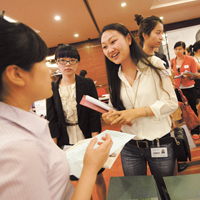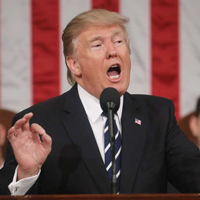-
俞敏洪:取消英语考试的建议仓促且鲁莽
理事简介俞敏洪,全国政协委员,中国与全球化智库(CCG)资深副主席,新东方教育集团董事长。 中国青年网北京3月5日电 “我觉得取消英语考试这个建议有点仓促,甚至比较鲁莽。”针对日前全国人大代表提出全面取消英语考试的建议,全国政协委员、新东方教育集团董事长俞敏洪表示,学习英语已经不再纯粹由国家决定了,这是中国走向世界的必然需求。 俞敏洪告诉记者,即使在美国、欧洲等国家,孩子们都有第二外语的考试。“这标志着现在的世界不再是孤立的世界,所以学习英语对孩子来说仍然是一件有好处的事情。” 虽然俞敏洪并不赞成取消英语考试,但他提出降低英语在高考中的比重,或者降低英语在高考中的难度。“如果有的家庭希望孩子未来出国深造,自然会给孩子增加英语学习的量,但英语对于普通老百姓,尤其是边远地区的孩子来说,学习起来依然有一定的困难。” 俞敏洪举例说,北京学生的英语水平较高,山西、四川山区学生的英语水平较低,但是高考却使用同样的英语试题,“这就会导致对孩子的不公平竞争,从这个意义上来讲,我是主张英语难度下降,但我不主张取消。”文章选自中国青年网,2017年3月5日
2017年3月7日 -
王辉耀:国际人才引进政策有望进一步开放
专家简介王辉耀,中国与全球化智库(CCG)主任。 本次政府工作报告的亮点很多,我本人更为关注报告在智库建设、广纳天下英才、积极参与全球经济治理等领域释放的重要信号。 一是社会智库有望在决策咨询方面发挥更加积极的作用。报告在2017年重点工作任务中再次指出要“建设中国特色新型智库”,而此前习近平总书记主持召开的中央深改组第三十二次会议上也审议通过了《关于社会智库健康发展的若干意见》。这是继两办《关于加强中国特色新型智库建设的意见》首次正式纳入“社会智库”这一不断增长的新型智库群体,强调“社会智库是中国特色新型智库的组成部分”后,中央高层决策机构第一次对社会智库进行研究、规划,是对中国社会智库建设的顶层设计,必将对我国社会智库建设起到重要指导作用。结合深改组会议与政府工作报告重点任务,我们相信社会智库的发展环境、管理体制等将有长足进步,社会智库有望在决策咨询领域发挥更加积极的作用。 二是国际人才引进政策有望进一步开放。报告指出“深化人才发展体制改革,实施更加有效的人才引进政策,广聚天下英才”。2015年来,我国相继出台多项国际人才引进相关的政策措施,目前深改组审议通过的《外国人永久居留证件便利化改革方案》也正在征集意见。在人才政策不断取得突破的同时,我们也应看到目前国际人才引进工作中还存在一些问题,国际人才管理和服务的体制机制还需要进一步完善。面对当前国际人才竞争中不断出现的机遇和挑战,我们期待进一步加快推进国际人才政策的开放,更好地吸纳全球人才为我所用。文章选自新浪智库,2017年3月6日
2017年3月7日 -
张红力:关于建立“一带一路”银行间合作机制的建议
第十二届全国政协第五次会议委员提案全国政协委员、中国工商银行副行长张红力提交《关于建立“一带一路”银行间合作机制的建议》理事简介张红力,全国政协委员,中国与全球化智库(CCG)副主席,中国工商银行副行长。一、背景和问题 三年多来,“一带一路”建设成果斐然,中国已与20个国家签署了产能合作协议,与17个国家共同建设了46个境外合作区。亚洲基础设施投资银行正式运营,57个国家积极参与其中。“共商、共建、共享”深入人心,“五通”领域齐头并进,初步实现了更平衡和更公平的区域经济发展。在这一过程中,金融业特别是中国的银行业发挥了重要作用,提供了大量资金支持,营造了良好的区域经济合作环境。尽管如此,银行的“桥梁”作用还远未充分发挥。目前“一带一路”沿线大部分国家信贷投放占GDP的比重平均为130%,低于170%的全球平均值。以下问题尤其值得关注: 一是市场环境风险较高对业务开展形成较大挑战。沿线国家多为发展中国家,企业和政府的财力有限,商业信用体系不完善;部分沿线国家金融系统性风险高,汇率稳定性不足,金融开放受限;少数国家安全局势严峻,缺乏业务开展的稳定性基础。 二是经济发展结构失衡不利于发展空间的持续拓展。全球金融危机的深层影响仍在继续,国际市场需求疲软。新兴市场多为外向型经济,外需不足导致国内市场萧条,传统经济增长模式受到挑战,但多数国家尚未明确转型道路,商业银行的传统发展空间受到限制。 三是金融实力相对不足也制约了服务能力的提升。“一带一路”建设中涉及的重大基础设施项目金额动辄数十亿美元,期限长达十余年,涉及多方甚至多国主体。沿线国家的很多银行受自身实力所限,无法在资金规模和综合化服务方面满足项目需求。例如,在吉尔吉斯斯坦注册的24家商业银行资产总量仅25亿美元,塔吉克斯坦2015年全部存款余额仅12.6亿美元。二、相关建议 “一带一路”沿线银行需要在更广范围、更深层次、更紧密的方式上加强合作,聚合沿线国家的金融力量,共建“一带一路”项目。建议由两到三家中资银行牵头,挑选沿线国家有一定实力的商业银行,通过合作委员会、联席会议等形式,加强市场开发、项目建设、贸易便利、金融市场、风险管理、信息科技等方面的商业合作,在共同为“一带一路”做好“资金融通”工作的同时,帮助沿线国家打造经济增长的内生金融动力。建设“一带一路”银行间合作机制,建议主要聚焦以下领域: 第一,建议整合项目资源,共享项目信息,开展联合营销,共同设计项目融资结构和担保措施,利用银团贷款、风险参贷、投贷结合等多种形式,提高大项目承贷能力。通过线上和线下渠道、双边和多边交易多种形式,为沿线银行之间资金拆借、债券回购、票据互换、转贷款等负债端管理提供便利。 第二,建议推动政府间、商业银行与政府间、以及商业银行间的双边或多边货币互换协议,引导市场形成合理稳定汇率预期。建立跨币种汇率和利率的“标的池”和“做市商”机制,集合不同沿线银行的汇率利率风险管理需求,撮合交易,降低汇率、利率等市场风险。扩大人民币在沿线银行间的支付、结算、清算运用比例,发挥人民币贸易、投资、储备、救助等国际货币功能。 第三,建议建立银团合作、资产交易等各项业务合作的文本标准,建设资金汇兑、清算结算的独立体系。共建信用评级模型,增进相互认同,在此基础上建立普遍认可的新型信用评估体系,降低外部评级依赖。共享征信评级结果,推动“一国征信、多国使用”,降低相关企业和个人跨境融资成本。 第四,加强沿线各国监管当局的政策交流和信息公开,开展沿线银行间的经验分享和咨询服务,便利沿线银行合规开展跨境业务。推动沿线银行在区域内互设机构,并在监管框架下加强反洗钱和反恐合作。文章选自金融界,2017年3月3日
2017年3月7日 -
张蕴岭:通过新机制创造新动能
专家简介张蕴岭,全国政协委员,中国与全球化智库(CCG)学术专家委员会专家,中国社会科学院学部委员。 日前,全国政协委员、中国社会科学院学部委员张蕴岭接受《中国日报》采访,展望2017年中国外交。 对于中国今年主办“一带一路”国际合作高峰论坛和金砖国家领导人第九次会晤,张蕴岭表示:“当前世界经济处在一个恢复的过程,还很艰难,这个时候中国通过推动‘一带一路’、金砖合作以及去年举办G20,为世界经济恢复增长提供新的动力。” 张蕴岭说:“因为从目前和今后看,世界增长最大的潜力还在于发展中国家,而发展中国家的发展还在于综合发展环境的提升,包括基础设施、产能构造等方面的提升,要帮助它们有能力发展起来。” 谈到去年英国“退欧”公投等事件,张蕴岭认为,当保守主义、内向主义、单边主义成为政治潮流的情况下,一些西方国家着重于自身发展,而恰恰是中国在通过新机制创造新动能。 张蕴岭说:“金砖、一带一路,还有RCEP(区域全面经济伙伴关系),都是一种基于开放、发展的战略,都不是封闭保守的战略。在出现退全球化、反对进口、鼓励出口的保护主义的情况下,我们推动的都是开放的。” 张蕴岭指出,中国作为世界第二大经济体,其经济增长占世界40%,中国到目前推的都是开放、合作、发展的、大的举措,在退全球化、保护主义抬头的当口,中国不是要“当头儿”,而是中坚力量,是引领着大家走。 对于当前中国经济,张蕴岭认为,中国经济正处在一个关键阶段。他说:“中国经济还处在调整期,中国主办这些活动也是要推动改革开放和转型……中国的调整,是通过和别人合作来加快转型,也叫‘合作型’的转型。文章选自中国日报网,2017年3月4日
2017年3月7日 -

【The Wall Street Journal】China Economy Draws More Students Back From Abroad
Beijing trumpets return of “sea turtles,” the thousands of students who left China to study abroad, but many may not have much choiceBEIJING: In recent years, Chinese students have increasingly opted out of the education system at home and gone abroad. Now, as China is eager to point out, a greater share of them are also coming back.“A hundred rivers eventually return to the sea, it’s the right time to build a dream together” read a recent headline in the Communist Party’s flagship newspaper, the People’s Daily, which declared the number of returning students to be the largest in history.But while the flood of haigui, or sea turtles, as they are known in Chinese, is a source of pride, it may not be patriotism or even economic opportunity driving the trend, but more practical matters like visas. And not everyone is joining in.A rise in incomes and frustration with China’s ultracompetitive education system produced a study-abroad fervor of historic proportions. The figure reached over half a million in 2015, more than 13 times the level in 2000, according to official statistics.In recent years, around 80% of such students have returned home, compared with about a third in 2006, according to the Education Ministry.One reason is that today’s crop skews more heavily undergraduate. In the past, students more typically were studying for doctorates or similarly advanced degrees that would have made landing a job abroad easier.There also are legal factors. In the U.S.—which polls show is the most popular destination for Chinese students—demand for H-1B skilled-worker visas has vastly outstripped supply for years, even for those with job offers.Those who don’t get a visa have to seek other options, such as applying to another degree program, or go home.China also has tried to entice students back by establishing industrial parks aimed at incubating startups led by returnees. While in 2000 China was home to around 50 such parks, today there are more than 300, though returnees cite bureaucratic challenges in accessing such resources.Beijing and other cities also dangle the offer of a coveted local residence permit, which confers a host of social benefits, for those with advanced degrees from overseas.A strong startup culture has taken hold in recent years, spurred in part by larger-than-life internet entrepreneurs such as Jack Ma, founder of Alibaba Group Holding.“China offers a lot of high-tech opportunities—like mobile internet, science and entrepreneurship—so it seems the opportunities, if not equal, can be even better than in the United States,” said Wang Huiyao, president of the Center for China and Globalization (CCG) think tank, and vice chairman of the China Western Returned Scholars Association.Feng Feng, 31 years old, returned with a master’s degree in education from the University of Pennsylvania in 2014 to found an education-consulting company in Beijing.Most of her Chinese friends in the U.S. also returned home, she said. “It’s easier to get a job in China,” she said.According to a 2016 survey by Mr. Wang’s think tank, around three-quarters of returnees make at least 5,000 yuan ($730) a month, with a quarter making more than 10,000 yuan.That beats the average monthly salary for domestic college graduates half a year after leaving school of 3,487 yuan, according to government statistics.But salaries are generally higher in the West, and the cost of a foreign education is a lot to recoup.With more overseas graduates returning and looking for work, competition has stiffened. These days, job-hunting haigui down on their luck are also known as haidai, or seaweed. And there are other factors to consider.Dezhi Fang, a 19-year-old junior at the Georgia Institute of Technology, said that between government incentives and business opportunities, the climate for returnees has greatly improved.But Mr. Fang, who is studying computer science, said that in the U.S. he has access to sources of research funding he wouldn’t be able to tap in China, and that China’s internet censorship is also a deterrent. “All my networks, both in academia and industry, are in the U.S.,” he said.He plans to stay after graduation to pursue either a doctorate or a job in the tech industry. Most of his Chinese friends also want to stay, he said.“The U.S. is still the greatest place for doing cutting-edge research,” he said.Chinese media last week trumpeted how 94-year-old Nobel laureate Chen Ning Yang and Turing Award winner Andrew Yao, 70, recently gave up their U.S. passports to take up Chinese citizenship again and join the Chinese Academy of Sciences.Back in Beijing, Ms. Feng, whose company helps advise Chinese firms on how to build education partnerships in the U.S., said she partly let her palate decide: “I don’t like food in the U.S.—too many sweet things and too much cheese.”(By Te-Ping Chen)From The Wall Street Journal,2017-3-1
2017年3月6日 -
宗庆后:建议在浙江设杭州知识产权法院
宗庆后,中国与全球化智库(CCG)副主席,杭州娃哈哈集团有限公司董事长。 第十二届全国人民代表大会第五次会议将于3月5日开幕。 日前,澎湃新闻(www.thepaper.cn)获悉,全国人大代表、杭州娃哈哈集团有限公司董事长兼总经理宗庆后将向大会提交《关于在杭州设立知识产权法院的建议》。 宗庆后表示,在全国人大常委会的支持下,北京、上海、广州相继设立了知识产权法院,对当地知识产权司法保护发挥了十分积极的作用。结合浙江经济社会发展的实际情况和知识产权司法保护的状况,建议在浙江设立杭州知识产权法院,以充分保障各类知识产权,促进浙江创新型经济更上一个台阶。 对于作此建议的理由,宗庆后表示,首先,浙江创新经济的快速发展需要加大知识产权的保护力度。浙江省已经成为了国内领先的创新大省、制造业大省,民营经济十分发达,知识产权的投入和产出获益明显。根据相关部门的统计资料显示:2016年浙江省新增发明专利授权量2.66万件,每万人口发明专利拥有量16.5件,位居全国前列;2016年商标申请量327572件,位居全国第三,有效注册商标量1315742件,位居全国第二。 其次,知识产权法院的设立不仅能有效满足浙江省知识产权司法保护需求,也能与浙江目前高水平的知识产权司法保护状况相适应。由于浙江省专利、商标、著作权以及商业秘密等知识产权发展迅速,与之相对应,浙江省知识产权司法保护需求量不断增长,知识产权民事纠纷数量也一直保持在高位运行。据了解,近五年来,浙江省法院受理各类知识产权民事一审案件76127件,审结74537件,收结案数均位居全国前列,而且有十多起案件已经入选了全国法院十大知识产权案件和五十个典型案例。而浙江法院审理的一些知识产权案件,不仅在国内,在国际上也具有极大的影响力。 此外,杭州具有设立知识产权法院的区域优势。杭州不仅是首批国家知识产权示范城市,还是国家科技和金融结合示范城市、国家级文化和科技融合示范基地。设立杭州知识产权法院,可以在提升杭州投资软环境和区域竞争优势的同时,引领浙江全省创新经济的发展,为浙江经济转型升级提供有力的司法保障。 据了解,杭州地区已有7家基层法院具有部分知识产权案件管辖权,审理的多起案件特别是专利类案件入选了全国法院十大知识产权案件和50个典型案例。而杭州中院知识产权审判庭通过推进司法改革,打造了以知识产权员额法官为核心、技术类案件审判经验丰富的专业审判团队,为设立杭州知识产权法院提供了基础人才保障。文章选自澎湃新闻网,2017年3月3日
2017年3月6日 -

【South China Morning Post】Beijing ’should mark’ Trump’s words
US president displaying neither friendship nor weakness, but is constantly testing Beijing’s bottom line, says trade expertUS president Donald Trump’s latest accusation that China is causing massive American factory closures should be a signal for the Chinese to be vigilant, mainland trade experts say.During his first address to the Congress on Tuesday, Trump announced plans for massive military expansion, reiterated his stance against terrorism, called for a “merit-based” immigration system and pledged a threefold increase in new infrastructure.In particular, he again described how international trade had damaged the US economy, and talked of imposing taxes and tariffs on other countries’ imports to strengthen America’s trade position, without giving details.“We’ve lost more than one-fourth of our manufacturing jobs since NAFTA was approved, and we’ve lost 60,000 factories since China joined the World Trade Organisation in 2001,” he told the Capitol.“Currently, when we ship products out of America, many other countries make us pay very high tariffs and taxes – but when foreign companies ship their products into America, we charge them almost nothing,” he said.Having heard that, Huo Jianguo, vice-chairman of the Ministry of Commerce’s China Society for WTO Studies, said Beijing should be mentally and practically prepared for the coming trade friction with the US, which was only a matter of time and scale.Unilateralism and protectionism had been the central concept of Trump’s view on trade, as well as his voter base, said Wang Huiyao, president of the Center for China and Globalization (CCG) and an adviser to the State Council.“China’s contribution to the creation of new US jobs and to maintaining low consumer prices for years has been ignored by him,” said Wang. “And this has been his long-held idea.”Although his ideas and personality has never changed, Trump has in fact displayed significant flexibility in terms of dealing with China, such as making no moves on his highly publicised policies during his election campaign such as slapping a 45 per cent border tax on Chinese goods or declaring China a currency manipulator, Huo said.He also stepped back and reaffirmed to president Xi Jinping the US commitment to the one-China policy, which he originally indicated might be up for negotiation.“He isn’t showing friendship, nor weakness. He has been constantly testing Beijing’s bottom line,” Huo said.After his telephone conversation with Xi two weeks ago, Trump yesterday met state councillor Yang Jiechi, who is likely to organise a face-to-face meeting of the two leaders.Keeping contact while making complaining in public was also a negotiation tactic of the “dealmaker” Trump, Huo suggested.As Trump continued to assess and shape his trade policies, China should increase contact and communication with his administration but be willing to take the trade fight to the Americans without sacrificing the relationship, he said. (By Liu Zhen)From South China Morning Post,2017-3-1
2017年3月6日